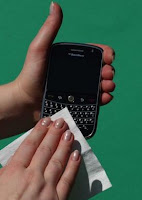"Ladies and Gentlemen, this is your captain speaking. It is now safe to turn on your electronic devices for the remainder of the flight.” As a traveler, you know how relieving this announcement can be because, if you’re like most people today, your cell phone or smartphone is your most useful device during your journey.
Our cell phones, laptops, and tablets allow us to stay connected to our jobs, family, facebook (very important) and they make our overall traveling experience much easier. Today, various apps allow you to check in on flights, create itineraries, convert currency, and translate spoken words into multiple languages. Add in the photo capturing, music player and mobile web capabilities, and our cell phones and smartphones get handled a lot during trips.
A New Health Risk to Mobile Users
 Now research shows that an average cell phone carries more germs than a public toilet seat, and most phones are covered with nasty creatures like Staphylococcus, MRSA and many others that not only will make you sick, but also, in severe cases, can be deadly. Scary? We think so too. It’s no secret that we are more prone to infection from germs while traveling, so taking time to clean your cell phone is a good idea.
Now research shows that an average cell phone carries more germs than a public toilet seat, and most phones are covered with nasty creatures like Staphylococcus, MRSA and many others that not only will make you sick, but also, in severe cases, can be deadly. Scary? We think so too. It’s no secret that we are more prone to infection from germs while traveling, so taking time to clean your cell phone is a good idea.Considering how often we snuggle up against our phones during a call, or text away during lunch, or perhaps plan the next leg of our trip from an exotic coast, cleaning the only item that follows us everywhere and often touches our face is a wise tip for today’s travelers.
Don’t let being sick put a damper on your next excursion. Clean your cell phone and tell your friends and family to do the same.
Safe and happy travels.
The CleenCell® Mobile Hygiene Campaign promotes personal electronic hygiene in hospitals, schools and homes. Cleaning your cell phone or electronic device can scratch the screen or damage the electronics of your phone. Use only products that are designed specifically to clean mobile electronics devices. CleenCell® Wipes are a reliable source.
















